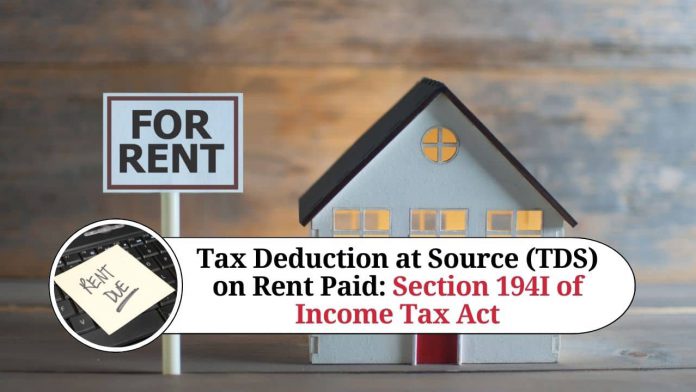Section 194I of the Income Tax Act, 1961, deals with the deduction of tax at source on income from rent. This section applies to individuals, Hindu Undivided Families (HUFs), and all other entities who are paying rent to a resident.
Under this section, if a person is paying rent to a resident, then they must deduct tax at the rate of 10% on the rent amount paid or credited to the account of the payee. However, if the rent paid or credited during the financial year does not exceed Rs. 2,40,000, then the person is not required to deduct tax at source.
It is important to note that the section applies only to rent payments made to residents. If the rent is paid to a non-resident, then the provisions of Section 195 of the Income Tax Act will apply, and the tax will be deducted at the rate specified in that section.
The term ‘rent’ for the purpose of this section includes any payment by whatever name called, under any lease, sub-lease, tenancy, or any other agreement or arrangement for the use of any land, building, or other property. It also includes payments for the use of plant and machinery, furniture, fittings, and any other equipment.
In case the rent is paid to a partnership firm, the tax deduction will be made in the name of the firm and not in the name of the partners. Similarly, in the case of rent paid to a company, tax will be deducted in the name of the company and not in the name of the directors or shareholders.
If the person making the rent payment is an individual or an HUF whose books of accounts are not required to be audited, then they are not required to obtain a Tax Deduction Account Number (TAN). However, if the person is a company, firm, or any other entity whose books of accounts are required to be audited, then they must obtain a TAN and quote it on all documents related to tax deduction at source.
conclusion
Section 194I of the Income Tax Act, 1961, is an important provision that governs the deduction of tax at source on income from rent. It is important for individuals, HUFs, and other entities to comply with the provisions of this section to avoid any penalties or legal consequences.
Other Related Blogs: Section 144B Income Tax Act
here are some frequently asked questions related to Section 194I of the Income Tax Act:
Q1. What is Section 194I of the Income Tax Act?
Section 194I of the Income Tax Act is a provision that deals with the deduction of tax at source on income from rent. It applies to individuals, Hindu Undivided Families (HUFs), and all other entities who are paying rent to a resident.
Q2. Who is responsible for deducting tax under Section 194I?
The person making the rent payment is responsible for deducting tax at the rate of 10% on the rent amount paid or credited to the account of the payee. However, if the rent paid or credited during the financial year does not exceed Rs. 2,40,000, then the person is not required to deduct tax at source.
Q3. Does Section 194I apply to rent paid to non-residents?
No, Section 194I applies only to rent payments made to residents. If the rent is paid to a non-resident, then the provisions of Section 195 of the Income Tax Act will apply, and the tax will be deducted at the rate specified in that section.
Q4. What is the meaning of the term ‘rent’ under Section 194I?
The term ‘rent’ for the purpose of Section 194I includes any payment by whatever name called, under any lease, sub-lease, tenancy, or any other agreement or arrangement for the use of any land, building, or other property. It also includes payments for the use of plant and machinery, furniture, fittings, and any other equipment.
Q5. Is a TAN required for tax deduction under Section 194I?
If the person making the rent payment is an individual or an HUF whose books of accounts are not required to be audited, then they are not required to obtain a Tax Deduction Account Number (TAN). However, if the person is a company, firm, or any other entity whose books of accounts are required to be audited, then they must obtain a TAN and quote it on all documents related to tax deduction at source.
here are some more frequently asked questions related to Section 194I of the Income Tax Act:
Q6. What happens if tax is not deducted under Section 194I?
If tax is not deducted at source as required under Section 194I, the person making the rent payment may be liable to pay interest, penalty, and other consequences as per the Income Tax Act.
Q7. Can the tax deducted under Section 194I be claimed as a refund?
Yes, the person on whose behalf tax has been deducted at source can claim a refund of the excess tax deducted, if any, while filing their income tax return.
Q8. Is there any provision for exemption from tax deduction under Section 194I?
No, there are no specific provisions for exemption from tax deduction under Section 194I. However, if the rent paid or credited during the financial year does not exceed Rs. 2,40,000, then the person is not required to deduct tax at source.
Q9. Is there any provision for lower tax deduction under Section 194I?
No, there are no specific provisions for lower tax deduction under Section 194I. The tax deduction rate is fixed at 10% of the rent amount paid or credited to the account of the payee.
Q10. Can a person be penalized for not obtaining a TAN for tax deduction under Section 194I?
Yes, if a person required to obtain a TAN under Section 194I fails to do so, they may be liable to pay a penalty of Rs. 10,000 under Section 272BB of the Income Tax Act.




















